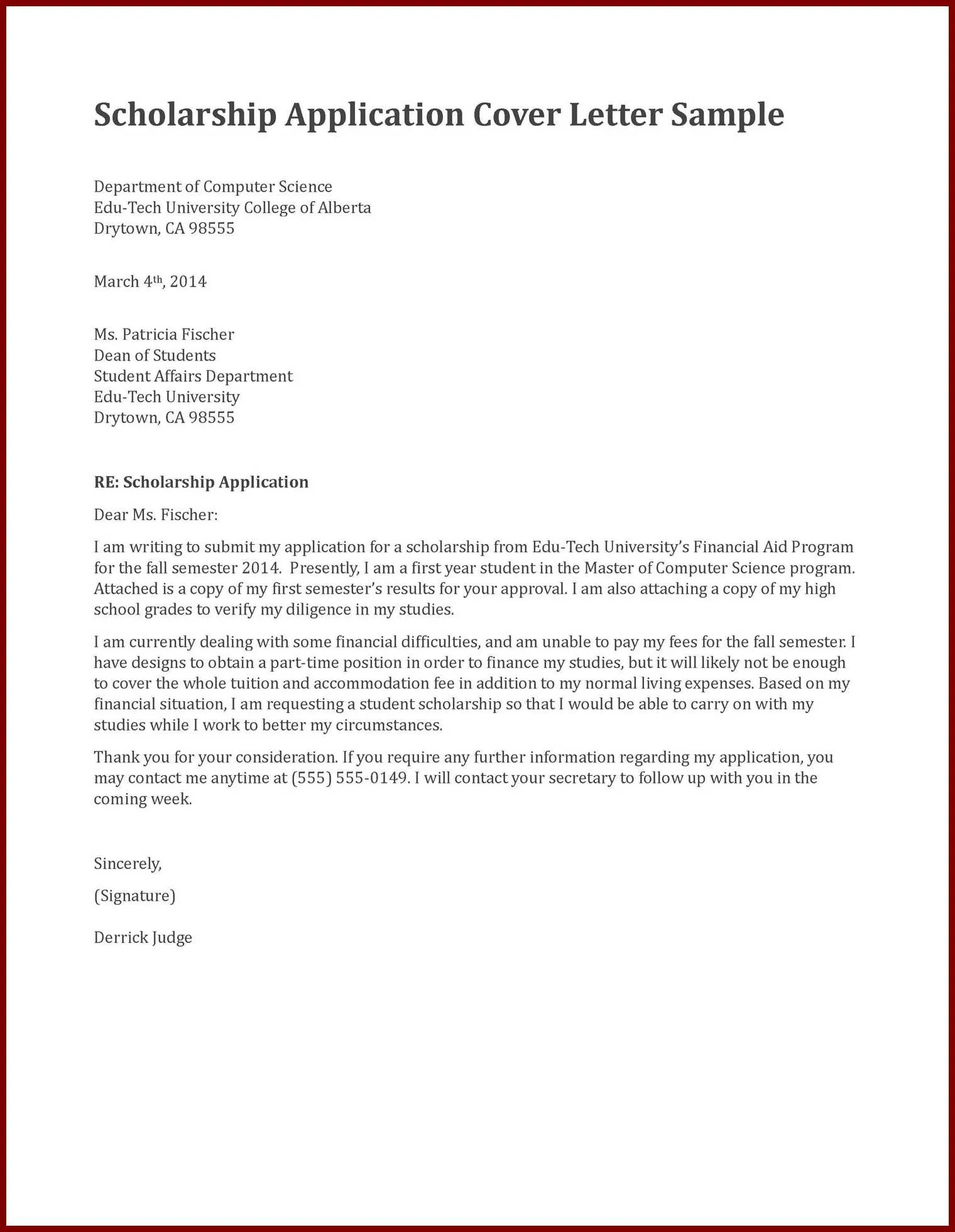Understanding the Purpose of a Scholarship Cover Letter
A scholarship cover letter is a crucial document that accompanies your scholarship application. It serves as your personal introduction, providing the scholarship committee with a glimpse into who you are beyond the application form and academic transcripts. Its primary goal is to persuade the committee that you are a worthy candidate, highlighting your qualifications, experiences, and aspirations. Unlike the application itself, the cover letter allows you to articulate your personality, passion, and unique qualities, setting you apart from other applicants. It’s your chance to make a strong first impression and demonstrate why you deserve the scholarship.
Why a Cover Letter Is Essential
While academic records and test scores are important, a cover letter adds a human element to your application. It enables you to connect with the selection committee on a personal level. The cover letter shows your writing ability, communication skills, and attention to detail, all of which are vital in college and future careers. Without a cover letter, you miss the opportunity to showcase your motivation, explain any inconsistencies in your application, and provide context to your achievements. It demonstrates your seriousness about the scholarship and your willingness to go the extra mile.
Key Components of a Scholarship Cover Letter
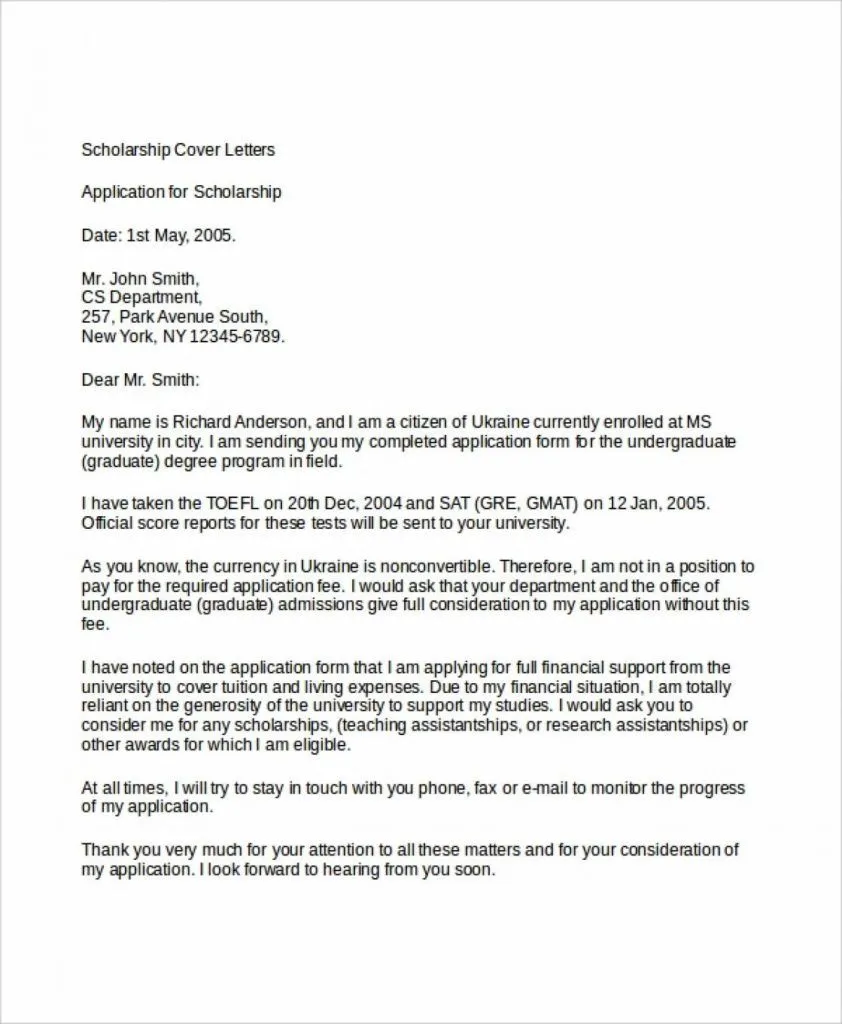
Contact Information and Date
At the top of your cover letter, include your full name, address, phone number, and email address. This is essential for the scholarship committee to contact you. Following your contact information, include the date on which you are submitting the letter. This helps the committee keep track of the timing of your application and provides a professional touch.
Applicant’s Details
Ensure that your contact information is accurate and up-to-date. Double-check your email address for any typos, and ensure that your phone number is accessible. Your address should match the one provided in your scholarship application.
Scholarship Provider’s Details
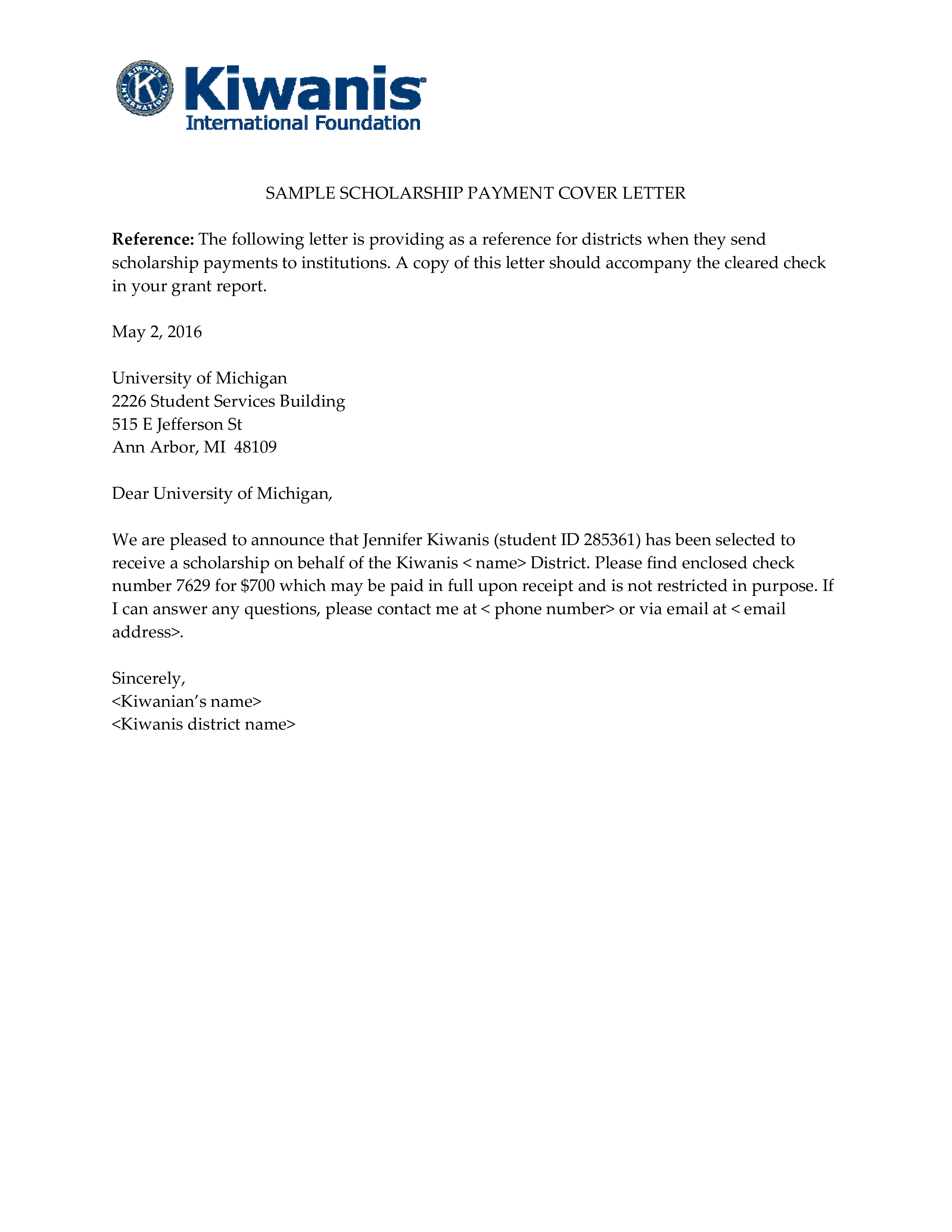
Below your contact information, it is standard practice to include the name of the scholarship provider, the name of the scholarship (if applicable), and the address of the organization or individual offering the scholarship. Addressing the letter to the correct contact shows you are serious about the application.
Formal Salutation
Start your cover letter with a formal salutation. If you know the name of the person reviewing applications, use it, like Dear Mr/Ms. [Last Name]. If you do not know the name, use a general greeting, such as Dear Scholarship Committee, or To Whom It May Concern. This sets the tone for a professional and respectful letter.
The Body of Your Cover Letter
Opening Paragraph
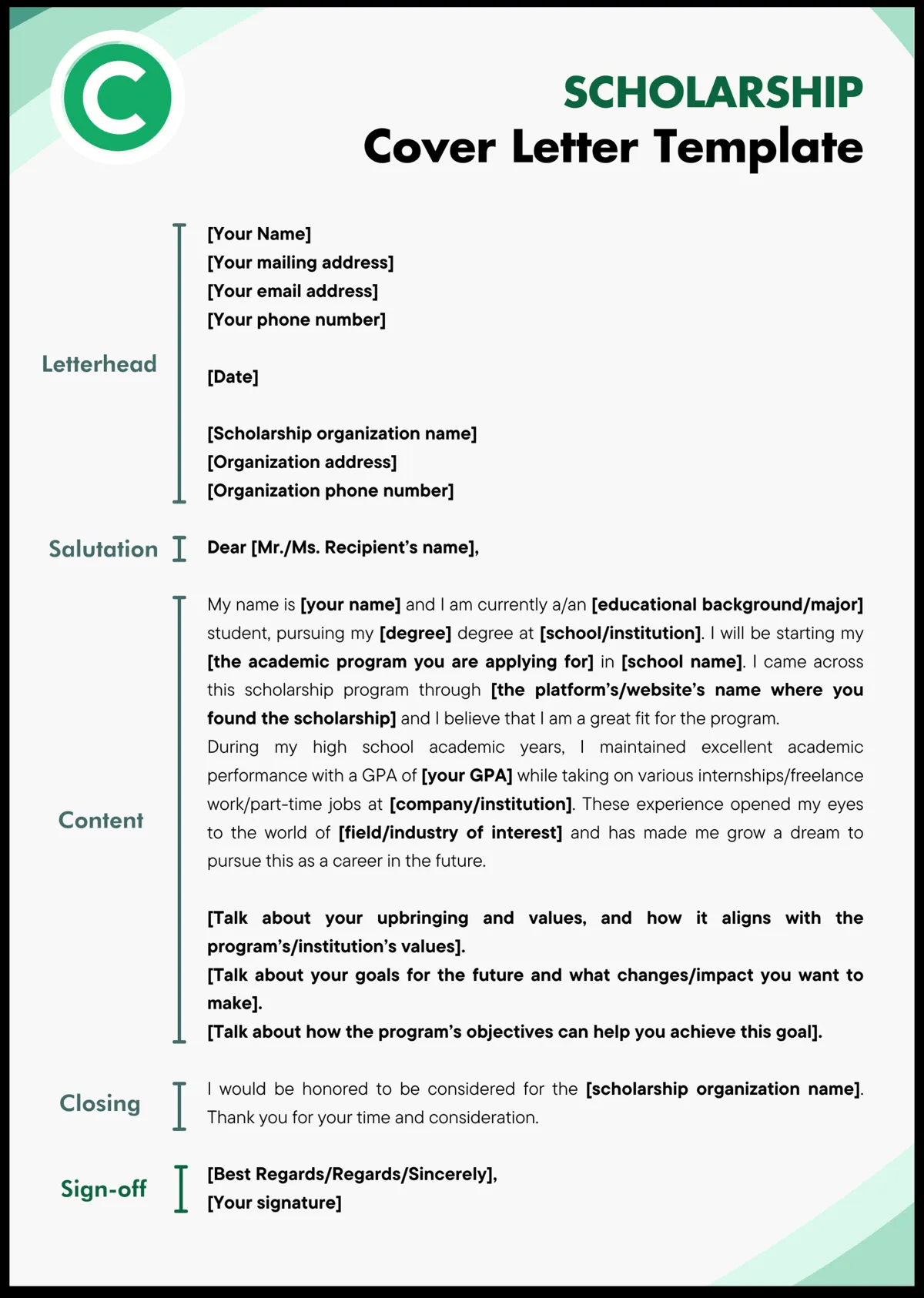
The opening paragraph should immediately state the purpose of your letter: to apply for the scholarship. Mention the specific scholarship you are applying for and briefly explain where you found the information about it. Show enthusiasm about the scholarship and the opportunity it offers. Briefly state why you believe you are a good candidate for the scholarship, creating an early positive impression.
Express Your Interest
Demonstrate genuine interest in the scholarship and the organization offering it. Research the scholarship provider and mention their values, mission, or any specific programs that resonate with you. This shows that you’ve taken the time to understand what the scholarship is about and that you align with their goals.
Highlight Relevant Achievements and Experiences
This is the core of your cover letter, where you showcase your qualifications. Choose a few key experiences or achievements that are most relevant to the scholarship’s criteria. Provide specific examples and quantify your accomplishments whenever possible. Focus on experiences that demonstrate leadership, academic excellence, community involvement, and skills relevant to your field of study.
Academic Achievements
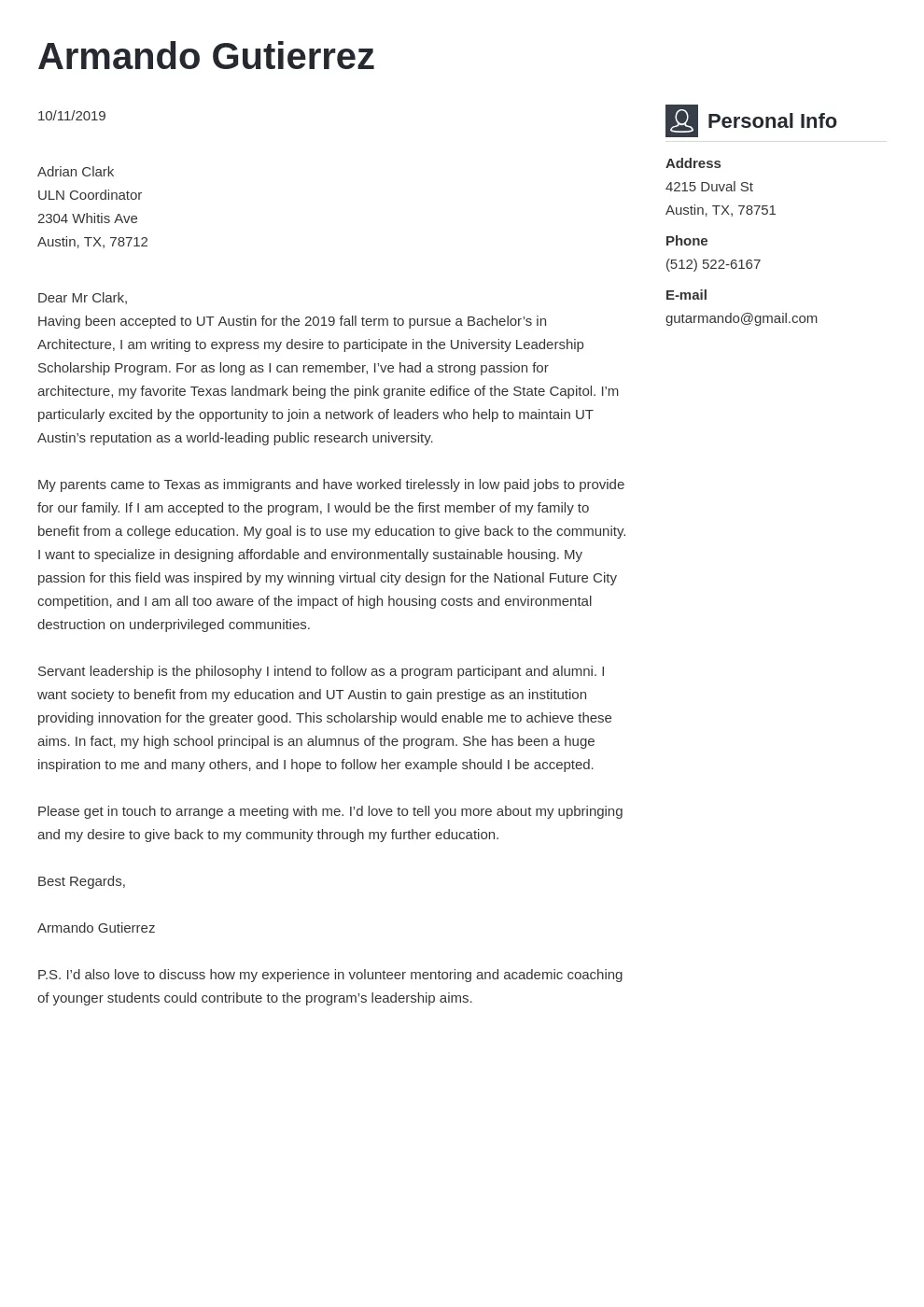
Highlight your academic achievements, such as your GPA, any awards or honors you’ve received, and any relevant coursework or projects. Mention any unique skills or knowledge you possess. If you have overcome academic challenges, briefly mention them and how you have succeeded. Explain how your academic performance is a good indicator of your potential for success.
Extracurricular Activities and Leadership Roles
Detail your involvement in extracurricular activities, clubs, sports, or volunteer work. Describe your leadership roles, responsibilities, and the impact you’ve made. Showcase how your activities have helped develop valuable skills, such as teamwork, communication, and time management. Emphasize how these experiences demonstrate your character and commitment.
Skills and Qualities
Showcase skills and qualities that make you a strong candidate, such as leadership, communication, problem-solving, or any specialized skills relevant to the scholarship. Use examples from your experiences to illustrate these qualities. Demonstrate your ability to think critically, work collaboratively, and persevere through challenges. Tailor these skills to what the scholarship committee values.
Showcase Your Financial Need
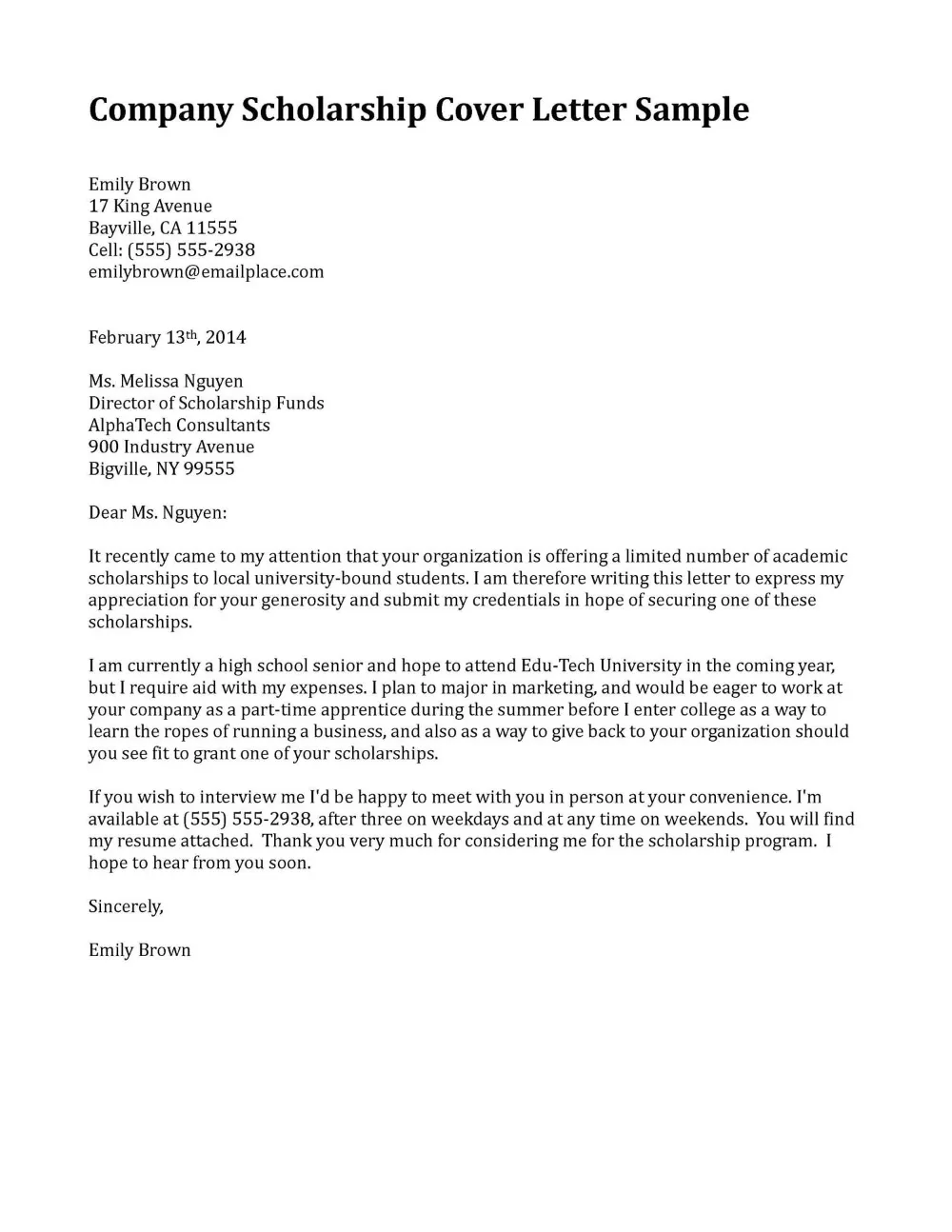
If the scholarship considers financial need, address this in your cover letter. Explain why you need the scholarship, such as family circumstances or the high cost of education. Be honest and straightforward, but avoid dwelling on the negative. Explain how the scholarship would help you achieve your educational and career goals. If you have any additional financial considerations, mention them briefly and respectfully. This helps them assess your eligibility and need.
Closing Paragraph
In your closing paragraph, summarize your key qualifications and reiterate your interest in the scholarship. Express your gratitude for the committee’s time and consideration. Make sure to end on a positive and confident note, showing your enthusiasm for the opportunity.
Express Gratitude
Thank the scholarship committee for considering your application. Show your appreciation for the opportunity to be considered for the scholarship, even if you are not selected. A simple statement of gratitude can leave a positive impression.
Call to Action
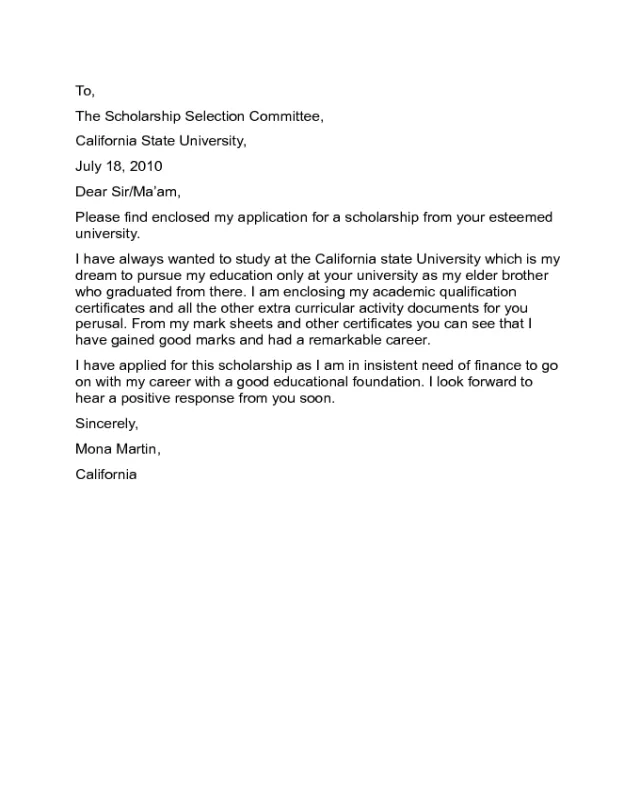
End your letter with a call to action. Reiterate your availability for an interview or any further information. Express your enthusiasm for the scholarship. This reinforces your interest and provides a final chance to leave a positive impact.
Formal Closing and Signature
Close your letter with a formal closing, such as Sincerely, Best regards, or Yours sincerely. Leave space for your handwritten signature above your typed name. Ensure your signature is legible and professional. Your typed name should include your full name, to avoid any confusion.
Proofreading and Formatting Your Letter
Thoroughly proofread your cover letter before submitting it. Check for any grammatical errors, spelling mistakes, and punctuation errors. Ensure the formatting is consistent and professional, with clear paragraphs and appropriate spacing. Use a readable font, such as Times New Roman or Arial. Have someone else review your letter to catch any errors you may have missed. A well-formatted and error-free letter reflects your attention to detail.
Tips for a Winning Scholarship Cover Letter
Tailoring Your Letter to the Scholarship
Customize each cover letter to the specific scholarship. Research the scholarship criteria and requirements, and highlight the aspects of your experience and qualifications that align with their values and goals. Mention specific details about the scholarship provider’s mission and how your aspirations match their objectives. Avoid using generic templates and personalize your letter to make a memorable impression.
Using Strong Action Verbs
Use strong action verbs to describe your accomplishments and experiences. Start your sentences with action verbs such as led, created, organized, achieved, managed, and developed. This makes your letter more dynamic and engaging, clearly conveying your achievements and skills. Avoid passive language and present your qualifications in an active and compelling manner.
Maintaining a Professional Tone
Keep a professional tone throughout your cover letter. Avoid slang, informal language, and overly casual phrasing. Use formal language and ensure your writing is clear, concise, and respectful. Maintain a positive attitude and focus on what you can bring to the scholarship program. Present yourself as a serious and committed candidate.
